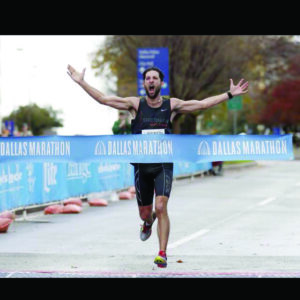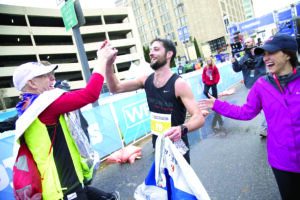By David Mullen
Dr. Logan Sherman is a chiropractic sports practitioner who has his feet clearly on the ground. A pacesetter in the science of marathon running preparation, he won the 2015 Dallas Marathon and is a three-time winner of the Dallas Half-Marathon.

Photos courtesy of Dr. Logan Sherman
Dr. Sherman, 36, spends most of his time at Sherman Sport & Spine at 4849 Greenville Ave., Suite 1180, but his workday begins with an early morning run. He likes to mix up his running routine, taking different routes from his home. He is also a fan of running around White Rock Lake or on the Katy Trail through the city, a favorite of his young daughter, who has a great view from a jogging stroller.
“A common mistake a lot of people make is to run the same course and then think they have to run faster and push harder,” Dr. Sherman said. “A lot of running is pretty easy if 80 percent of your running is done at an easy pace and 20 percent is at a hard pace.”
The North Dallas native took up running at an early age. “My dad was a big runner.” Dr. Sherman said of his father and marathoner. “When I was a kid, I remember going to the finish line. I ran in [his first marathon] a relay race as a freshman [at Jesuit} in high school. That was my first mind-blowing experience of how a big race could function and it makes you feel.” He advanced his running career as a member of the Texas A&M track and field and cross-country teams.
Dr. Sherman fondly recalls his first race in Dallas and now sits on the board of the BMW Dallas Marathon Festival. He also has run in the New York Marathon and three times in the Boston Marathon. “My first year was the bombing. We were already back in the room, so we were safe. I had just finished in emergency care certification course, so I was able to help out at the Boston Commons after.”
Anyone who has run a marathon will have a story about “hitting the wall,” the sudden loss of energy and presence during a long race. “The wall is a very real thing,” Dr. Sherman said. “You can find ways to dampen that blow by your training program and getting the miles under your belt. The second thing is making sure that your nutrition is good, fueling yourself before and during the race.”

Dr. Sherman believes full marathon training takes 14 to 16 weeks, slightly less for a half-marathon.
The 2022 BMW Dallas Marathon is Sunday, Dec. 11, so it is ideal for first-time distance runners to begin focusing on the Dallas race.
He credits great coaching early in his running career for helping him develop his tips for training. “My favorite piece of advice that I was given prior to my first marathon [2009 Dallas] was from the ’96 Dallas Marathon champion, Dr. William Moore. He told me through an email the night before the race, ‘patience, patience, patience.’ You should be very comfortable in the early stages of the race and your pace should be almost conversational.”
He believes in starting at the bottom. “Your shoes are the most important item you will purchase,” Dr. Sherman states. “There are many stores around the DFW area that will assess your gait and put you into the right shoes.” He suggests runners start slowly and build while allowing for recovery phases. “My rule was to build mileage over the course of two to three weeks and [then] take a recovery week running about 75 percent of the average mileage I was running pre-recovery.”
He likes running in groups for motivation and sociability, and taking the time to care for one’s body. “Make sure you start a good program of stretching, foam rolling and performing strength exercises prior to starting your program so that you have a good routine,” Dr. Sherman advises. “I am a huge proponent of foam rolling, and I believe it is important to do prior to your run, as well as after. I also believe that strength training is critical to prevent injuries. As a sports chiropractor, I find that most of my clients who come in for an injury are not performing strength exercises outside of running.”
When training, he dedicates at least three days per week for lifting weights. “I credit strength training to my relatively healthy career, which says a lot for someone who ran [more than] 100-mile weeks for most of the year.
“Honestly the training in and of itself helps people mentally prepare for it,” Dr. Sherman pledges. “The excitement of the race day and the spectators cheering you on in the middle of the course really takes your mind off of what you might be going through in the moment.”
As far as dietary changes to prepare for running long distances, “I encourage people to consult with a nutritionist if they have any specific questions about their nutritional needs. Because you are running more, you get the added perk of eating more and enjoying more foods. I do feel that it is important to eat fresh foods that include a variety of meats, vegetables and fruits. I also encourage people to try to eat within 30-minutes after a long run or a hard workout. This helps replenish any losses that you may have experienced.”
Dr. Sherman likes the atmosphere at the BMW Dallas Marathon, and this year will be working on the race experience and not on running in the race.
“There is a lot of crowd support and the energy at the start/finish line is unmatched by a lot of marathons. Feeding off the energy of those who are running around you and cheering you on is one of the best attributes of our race.
“Regardless, having a plan and executing it is one of the best ways to stay inspired both during your training and the race. I tell everyone to enjoy the process. Running can positively influence social, physical and emotional gains for someone.”
Dr. Logan Sherman believes that preparing for the 2022 BMW Dallas Marathon should begin now and has the plan for future distance runners, where they can avoid hitting the wall before hitting the finish line.
